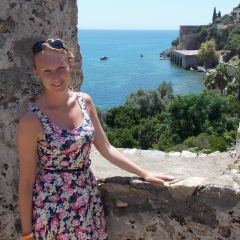ЧЕТВЕРТАЯ БАЛЛАДА
В Москве взрывают наземный транспорт - такси, троллейбусы, все подряд.
В метро ОМОН проверяет паспорт у всех, кто черен и бородат,
И это длится седьмые сутки. В глазах у мэра стоит тоска.
При виде каждой забытой сумки водитель требует взрывника.
О том, кто принял вину за взрывы, не знают точно, но много врут.
Непостижимы его мотивы, непредсказуем его маршрут,
Как гнев Господень. И потому-то Москву колотит такая дрожь.
Уже давно бы взыграла смута, но против промысла не попрешь.
И чуть затлеет рассветный отблеск на синих окнах к шести утра,
Юнец, нарочно ушедший в отпуск, встает с постели. Ему пора.
Не обинуясь и не колеблясь, но свято веря в свою судьбу,
Он резво прыгает в тот троллейбус, который движется на Трубу
И дальше кружится по бульварам ("Россия" - Пушкин - Арбат - пруды) -
Зане юнец обладает даром спасать попутчиков от беды.
Плевать, что вера его наивна. Неважно, как там его зовут.
Он любит счастливо и взаимно, и потому его не взорвут.
Его не тронет волна возмездии, хоть выбор жертвы необъясним.
Он это знает и ездит, ездит, храня любого, кто рядом с ним.
И вот он едет.
Он едет мимо пятнистых скверов, где визг играющих малышей
Ласкает уши пенсионеров и греет благостных алкашей,
Он едет мимо лотков, киосков, собак, собачников, стариков,
Смешно целующихся подростков, смешно серьезных выпускников,
Он едет мимо родных идиллий, где цел дворовый жилой уют,
Вдоль тех бульваров, где мы бродили, не допуская, что нас убьют, -
И как бы там ни трудился Хронос, дробя асфальт и грызя гранит,
Глядишь, еще и теперь не тронут: чужая молодость охранит.
...Едва рассвет окровавит стекла и город высветится опять,
Во двор выходит старик, не столько уставший жить, как уставший ждать.
Боец-изменник, солдат-предатель, навлекший некогда гнев Творца,
Он ждет прощения, но Создатель не шлет за ним своего гонца.
За ним не явится никакая из караулящих нас смертей.
Он суше выветренного камня и древней рукописи желтей.
Он смотрит тупо и безучастно на вечно длящуюся игру,
Но то, что мучит его всечасно, впервые будет служить добру.
И вот он едет.
Он едет мимо крикливых торгов и нищих драк за бесплатный суп,
Он едет мимо больниц и моргов, гниющих свалок, торчащих труб,
Вдоль улиц, прячущих хищный норов в угоду юному лопуху,
Он едет мимо сплошных заборов с колючей проволокой вверху,
Он едет мимо голодных сборищ, берущих всякого в оборот,
Где каждый выкрик равно позорящ для тех, кто слушает и орет,
Где, притворяясь чернорабочим, вниманья требует наглый смерд,
Он едет мимо всего того, чем согласно брезгуют жизнь и смерть:
Как ангел ада, он едет адом - аид, спускающийся в Аид, -
Храня от гибели всех, кто рядом (хоть каждый верит, что сам хранит).
Вот так и я, примостившись между юнцом и старцем, в июне, в шесть,
Таю отчаянную надежду на то, что все это так и есть:
Пока я им сочиняю роли, не рухнет небо, не ахнет взрыв,
И мир, послушный творящей воле, не канет в бездну, пока я жив.
Ни грохот взрыва, ни вой сирены не грянут разом, Москву глуша,
Покуда я бормочу катрены о двух личинах твоих, душа.
И вот я еду.
© Дмитрий Быков, 1996 год.
В Москве взрывают наземный транспорт - такси, троллейбусы, все подряд.
В метро ОМОН проверяет паспорт у всех, кто черен и бородат,
И это длится седьмые сутки. В глазах у мэра стоит тоска.
При виде каждой забытой сумки водитель требует взрывника.
О том, кто принял вину за взрывы, не знают точно, но много врут.
Непостижимы его мотивы, непредсказуем его маршрут,
Как гнев Господень. И потому-то Москву колотит такая дрожь.
Уже давно бы взыграла смута, но против промысла не попрешь.
И чуть затлеет рассветный отблеск на синих окнах к шести утра,
Юнец, нарочно ушедший в отпуск, встает с постели. Ему пора.
Не обинуясь и не колеблясь, но свято веря в свою судьбу,
Он резво прыгает в тот троллейбус, который движется на Трубу
И дальше кружится по бульварам ("Россия" - Пушкин - Арбат - пруды) -
Зане юнец обладает даром спасать попутчиков от беды.
Плевать, что вера его наивна. Неважно, как там его зовут.
Он любит счастливо и взаимно, и потому его не взорвут.
Его не тронет волна возмездии, хоть выбор жертвы необъясним.
Он это знает и ездит, ездит, храня любого, кто рядом с ним.
И вот он едет.
Он едет мимо пятнистых скверов, где визг играющих малышей
Ласкает уши пенсионеров и греет благостных алкашей,
Он едет мимо лотков, киосков, собак, собачников, стариков,
Смешно целующихся подростков, смешно серьезных выпускников,
Он едет мимо родных идиллий, где цел дворовый жилой уют,
Вдоль тех бульваров, где мы бродили, не допуская, что нас убьют, -
И как бы там ни трудился Хронос, дробя асфальт и грызя гранит,
Глядишь, еще и теперь не тронут: чужая молодость охранит.
...Едва рассвет окровавит стекла и город высветится опять,
Во двор выходит старик, не столько уставший жить, как уставший ждать.
Боец-изменник, солдат-предатель, навлекший некогда гнев Творца,
Он ждет прощения, но Создатель не шлет за ним своего гонца.
За ним не явится никакая из караулящих нас смертей.
Он суше выветренного камня и древней рукописи желтей.
Он смотрит тупо и безучастно на вечно длящуюся игру,
Но то, что мучит его всечасно, впервые будет служить добру.
И вот он едет.
Он едет мимо крикливых торгов и нищих драк за бесплатный суп,
Он едет мимо больниц и моргов, гниющих свалок, торчащих труб,
Вдоль улиц, прячущих хищный норов в угоду юному лопуху,
Он едет мимо сплошных заборов с колючей проволокой вверху,
Он едет мимо голодных сборищ, берущих всякого в оборот,
Где каждый выкрик равно позорящ для тех, кто слушает и орет,
Где, притворяясь чернорабочим, вниманья требует наглый смерд,
Он едет мимо всего того, чем согласно брезгуют жизнь и смерть:
Как ангел ада, он едет адом - аид, спускающийся в Аид, -
Храня от гибели всех, кто рядом (хоть каждый верит, что сам хранит).
Вот так и я, примостившись между юнцом и старцем, в июне, в шесть,
Таю отчаянную надежду на то, что все это так и есть:
Пока я им сочиняю роли, не рухнет небо, не ахнет взрыв,
И мир, послушный творящей воле, не канет в бездну, пока я жив.
Ни грохот взрыва, ни вой сирены не грянут разом, Москву глуша,
Покуда я бормочу катрены о двух личинах твоих, душа.
И вот я еду.
© Дмитрий Быков, 1996 год.
FOURTH BALLADA
In Moscow, ground transportation is blown up - taxis, trolley buses, everything.
In the metro riot police checks the passport of all those who are black and bearded,
And it lasts the seventh day. In the eyes of the mayor is melancholy.
At the sight of each bag forgotten driver requires a shooter.
They do not know exactly who took the blame for the explosions, but they lie a lot.
His motives are incomprehensible, his route is unpredictable,
Like the wrath of the Lord. And that is why Moscow is shaking so much.
Already long ago they would have leaped a distemper, but you can’t argue against fishing.
And a little dawn glimmer on the blue windows by six in the morning,
The youngster, who purposely went on vacation, gets out of bed. He has to go.
Without leaning or hesitating, but sacredly believing in your destiny,
He briskly jumps into that trolleybus, which moves to the Pipe
And then it turns around the boulevards ("Russia" - Pushkin - Arbat - ponds) -
Zane the youth has the gift of saving companions from harm.
Do not care that his faith is naive. No matter what his name is there.
He loves happily and mutually, and therefore he will not be blown up.
He will not be touched by a wave of retribution, even though the choice of the victim is inexplicable.
He knows it and drives, drives, keeping anyone who is near him.
And here he goes.
He drives past spotty squares, where the screeching of playing kids
Caresses the ears of pensioners and warms blissful drunks,
He drives past the stalls, kiosks, dogs, dog lovers, old people,
Funny kissing teenagers, funny serious graduates,
He goes past his native idylls, where the yard living comfort is whole,
Along those boulevards where we wandered, not allowing us to be killed, -
And no matter how hard Chronos worked, crushing asphalt and gnawing granite,
You look, also now are not touched: someone else's youth will protect.
... As soon as dawn bleeds the glass and the city is highlighted again,
An old man enters the courtyard, not so much tired of living, as tired of waiting.
A traitor fighter, a traitor soldier who once brought on the wrath of the Creator,
He is waiting for forgiveness, but the Creator does not send his messenger after him.
Behind him, none of the death stalls will come.
It is drier weathered stone and an ancient manuscript of yellow.
He looks stupidly and indifferently to the everlasting game,
But that which torments him hourly will serve good for the first time.
And here he goes.
He drives past loud trades and beggars for free soup,
He drives past hospitals and morgues, rotting dumps, protruding pipes,
Along the streets, hiding predatory burrows in favor of the young mug,
He drives past solid fences with barbed wire at the top,
He rides past the hungry gatherings that take everything into circulation,
Where every cry equals shame for those who listen and shout,
Where, pretending to be a laborer, attention requires impudent smerd,
He rides past all that life and death condemn according to:
Like an angel of hell, he goes to hell - Hades, going down to Hades -
Keeping from death all who are near (even though everyone believes that he himself keeps).
And so I, perched between a youth and an old man, in June, at six,
Tayu desperate hope that all this is so:
While I am writing them roles, the sky will not collapse, the explosion will not gasp,
And the world, obedient to the creative will, will not sink into the abyss as long as I live.
Neither the roar of the explosion, nor the howling of the siren burst at once, wilderness Moscow,
As long as I mumble quatrains about your two faces, soul.
And here I am going.
© Dmitry Bykov, 1996.
In Moscow, ground transportation is blown up - taxis, trolley buses, everything.
In the metro riot police checks the passport of all those who are black and bearded,
And it lasts the seventh day. In the eyes of the mayor is melancholy.
At the sight of each bag forgotten driver requires a shooter.
They do not know exactly who took the blame for the explosions, but they lie a lot.
His motives are incomprehensible, his route is unpredictable,
Like the wrath of the Lord. And that is why Moscow is shaking so much.
Already long ago they would have leaped a distemper, but you can’t argue against fishing.
And a little dawn glimmer on the blue windows by six in the morning,
The youngster, who purposely went on vacation, gets out of bed. He has to go.
Without leaning or hesitating, but sacredly believing in your destiny,
He briskly jumps into that trolleybus, which moves to the Pipe
And then it turns around the boulevards ("Russia" - Pushkin - Arbat - ponds) -
Zane the youth has the gift of saving companions from harm.
Do not care that his faith is naive. No matter what his name is there.
He loves happily and mutually, and therefore he will not be blown up.
He will not be touched by a wave of retribution, even though the choice of the victim is inexplicable.
He knows it and drives, drives, keeping anyone who is near him.
And here he goes.
He drives past spotty squares, where the screeching of playing kids
Caresses the ears of pensioners and warms blissful drunks,
He drives past the stalls, kiosks, dogs, dog lovers, old people,
Funny kissing teenagers, funny serious graduates,
He goes past his native idylls, where the yard living comfort is whole,
Along those boulevards where we wandered, not allowing us to be killed, -
And no matter how hard Chronos worked, crushing asphalt and gnawing granite,
You look, also now are not touched: someone else's youth will protect.
... As soon as dawn bleeds the glass and the city is highlighted again,
An old man enters the courtyard, not so much tired of living, as tired of waiting.
A traitor fighter, a traitor soldier who once brought on the wrath of the Creator,
He is waiting for forgiveness, but the Creator does not send his messenger after him.
Behind him, none of the death stalls will come.
It is drier weathered stone and an ancient manuscript of yellow.
He looks stupidly and indifferently to the everlasting game,
But that which torments him hourly will serve good for the first time.
And here he goes.
He drives past loud trades and beggars for free soup,
He drives past hospitals and morgues, rotting dumps, protruding pipes,
Along the streets, hiding predatory burrows in favor of the young mug,
He drives past solid fences with barbed wire at the top,
He rides past the hungry gatherings that take everything into circulation,
Where every cry equals shame for those who listen and shout,
Where, pretending to be a laborer, attention requires impudent smerd,
He rides past all that life and death condemn according to:
Like an angel of hell, he goes to hell - Hades, going down to Hades -
Keeping from death all who are near (even though everyone believes that he himself keeps).
And so I, perched between a youth and an old man, in June, at six,
Tayu desperate hope that all this is so:
While I am writing them roles, the sky will not collapse, the explosion will not gasp,
And the world, obedient to the creative will, will not sink into the abyss as long as I live.
Neither the roar of the explosion, nor the howling of the siren burst at once, wilderness Moscow,
As long as I mumble quatrains about your two faces, soul.
And here I am going.
© Dmitry Bykov, 1996.
У записи 1 лайков,
0 репостов.
0 репостов.
Эту запись оставил(а) на своей стене Олеся Акимова






















